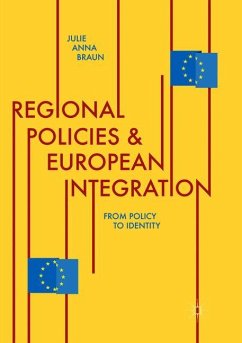This book examines what role regions play in European (dis)integration and European identity building. Filling a glaring gap in our understanding of regions, the book considers what the scope and objectives of these regions' respective European policies and programmes are, how diverse they are and, in a time of mixed signals of European cynicism and identity, how European identity is perceived, fostered and even promoted in regions' European policies. In doing so, the book presents empirical findings on four EU regions as case studies, including Germany's Brandenburg; Belgium's Wallonia; France's Nord-Pas de Calais; and last but certainly in the current context of Brexit not least, the South West of England.
"This book coherently brings theoretical insights together with proper empirical validation and extensions. ... Overall, this book offers an occasion to reflect on European financial support to regional economies going beyond a pure economic logic. ... it constitutes an important reading to obtain insights into the surprisingly under-researched social nuances of European regional policy and, in particular, its eventual ability to foster community-identity logics and, in turn, long-range support for European integration." (Regional Studies, Vol. 53 (11), 2019)








